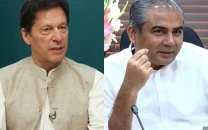Toned-down Secrets Act Bill sails through Senate
Lawmakers were unhappy with tweak that allowed intel agencies to search person or place without warrant

The Senate on Sunday passed the Official Secrets (Amendment) Bill, 2023, after the government withdrew the change in it that gave powers to the intelligence agencies to enter and search any person or place without a warrant.
Federal Law and Justice Minister Senator Azam Nazeer Tarar explained in the upper house of parliament that he had examined the bill, which had already been passed by the National Assembly.
After the bill was recently presented in the Senate, several lawmakers raised objections against it.
Referring to the proposed clause giving powers of arrest without warrants to the intelligence agencies, the law minister said it was deliberated upon in the committee concerned as well as in the House.
“The government has decided to withdraw the amendment after deliberations,” he informed the senators.
Subsequently, the proposed clause was deleted.
In the deleted amendment, the PML-N-led government wanted to empower the intelligence agencies to enter or search any person or place without a warrant.
It had removed the condition that a search warrant be issued if a magistrate was satisfied by information on oath that there were reasonable grounds that an offence had or about to be committed.
The newly proposed – but now omitted – sub-section (2A) in Section 11 of the secrets act read: “Notwithstanding anything contained in this Act or in any other law for the time being in force, the Intelligence Agencies may, at any time, enter and search any person or place, without warrant, and if necessary, by use of force, and seize any document, sketch, plan, model, article, note, weapon, ammunition, electronic or modern devices or anything of like nature, or anything which is or can be evidence of an offence committed, or suspecting of been committee, under this Act.”
The law minister also said the government had made another amendment to Section 4 (communication with enemy or foreign agents to be evidence of commission of certain offence).
The proposed section read: “A person may be presumed to have been in communication with enemy or foreign agent if he has either within or outside Pakistan visited the address of a foreign agent or consorted or associated with enemy or a foreign agent.”
The minister explained that the word “knowingly” had been added to the clause to expel the impression that an accidental visit would also be used against the person concerned.
The newly inserted Section 6-A (unauthorised disclosure of identities, etc), which states that a “person shall commit an offence who intentionally acting in any manner prejudicial to public order, safety, interest or defence of Pakistan, or any part thereof, discloses in such a manner that exposes the identity of such undisclosed persons in any manner the identity of the members of the intelligence agencies, or the informants or sources thereof”, also came under discussion.
Tarar elaborated that the heads of the intelligence agencies were notified and kept in loop but the lower staff working under cover were previously targeted as their photos were not only displayed in the war areas but also circulated on social media, putting their lives in danger.
He added that such an act had been made an offence, which carried the punishment of imprisonment for a term which might extend to three years or a fine extending to Rs1 million or both.
The minister further told the lawmakers that the definition of “documents” had been changed to include modern devices.
Tarar continued that the “face agency” under the bill was still the Federal Investigation Agency (FIA) and its powers had been enhanced.
Elaborating further, he said these powers included the authority given to FIA director general to form a joint investigation team (JIT) headed by an official of the agency.
However, he added that the JIT could also include the relevant official of any intelligence agency as these matters were of national security.
The minister’s explanation came after Jamaat-e-Islami Senator Mushtaq Ahmed objected to the bill saying that the changes made to the legislation were minor in nature and its spirit was intact and same as before.
“If we pass this bill in its present form, the entire country would be converted into a cantonment…and the human rights and political and press freedom would be severely affected,” the JI senator claimed.
Similarly, PPP Senator Raza Rabbani pointed out that the text of the bill did not disclose the necessity for amending the secrets act.
After giving the explanation, Tarar urged the House to pass the bill as not only had it been examined but passed by the committee concerned as it was in the “national interest”.
Subsequently, the bill was passed by the Senate.
The upper house also passed the Higher Education Commission (Amendment) Bill, 2023; Pakistan International Airline Corporation (Conversion) (Amendment) Bill, 2023; and Zakat and Ushr (Amendment) Bill, 2023.


















COMMENTS
Comments are moderated and generally will be posted if they are on-topic and not abusive.
For more information, please see our Comments FAQ